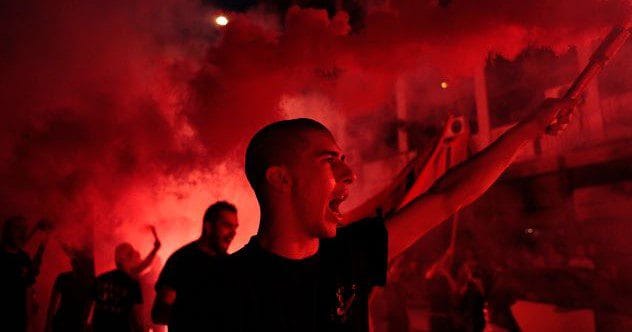In recent years, the rise of far-right groups has become a significant concern worldwide. These groups often fly under the radar, escaping the intense scrutiny faced by their more prominent counterparts. Despite their lower profile, they can significantly impact local and national politics, social dynamics, and public safety. Let’s explore ten lesser-known far-right groups that you should be aware of.
Soldiers of Odin (Finland)
The Soldiers of Odin, an anti-immigrant group in Finland, emerged in response to the influx of asylum seekers. They claim to protect Finnish citizens by patrolling streets, attributing rising crime to “Islamist intruders.”
Critics argue that the Soldiers of Odin promote xenophobia and spread fear among immigrant communities, exploiting public fear to further their agendas. While some locals support their presence, many condemn their actions as dangerous and divisive. The group has also spread to other countries, including Canada.
The Base (USA)
Founded in 2018 by Rinaldo Nazzaro, The Base is a militant neo-Nazi organization promoting white supremacist ideologies and advocating for violent extremism. Structured as a decentralized network, members communicate through encrypted online platforms.
The Base engages in paramilitary training, recruitment, and planning attacks to incite a race war. The group attracts disaffected individuals with military or survivalist skills, radicalizing them through propaganda emphasizing racial purity and anti-government sentiments. They have been linked to numerous violent plots and arrests.
Nordic Resistance Movement (Scandinavia)
The Nordic Resistance Movement (NRM) is a neofascist organization aiming to create a white Nordic ethnostate. Founded in Sweden in 1997, it has about 200 active members across Nordic countries.
NRM promotes antisemitic conspiracy theories and supports accelerationism, believing that societal collapse will pave the way for their ideology. They actively recruit women and engage in community activities to build support while collaborating with other extremist groups. NRM members have been arrested for violent activities, including bombings and murder plots.
Generation Identity (Europe)
Generation Identity (GI) is an anti-immigrant organization founded in France in 2012. They adhere to the “Great Replacement” theory, which claims that European culture is being eroded by non-European immigrants.
GI gained attention through provocative stunts, such as occupying a mosque and attempting to block refugee rescue operations. In 2021, the French government dissolved Generation Identity, citing incitement of discrimination, hatred, and violence.
Nationalist Social Club (USA/Europe)
The Nationalist Social Club (NSC-131) is a white supremacist group that started in the northeastern United States and now has a presence in Europe. Founded in 2019, the NSC operates through independent cells and promotes a white nationalist ideology, preparing for conflict with non-Aryans.
NSC members participate in right-wing rallies, display Nazi symbols, and antagonize social justice protests. Despite some internal divisions, NSC-131 continues to function as a significant white supremacist entity with a transnational reach engaging in physical combat training and weapons stockpiling.
National Action (UK)
National Action, a neofascist group in the UK, operated from 2013 until it was banned in 2017. The group aimed to create a “white jihadist” movement, embracing overt racism and militancy.
Their activities included online harassment, antisemitic demonstrations, and celebrations of violence. Following their ban, some leaders attempted to continue the group covertly, but enforcement led to a decline in membership.
White Power Ranger Squad (Russia)
The White Power Ranger Squad (WPRS) is a far-right extremist group gaining traction in Russia amid the conflict with Ukraine. The group is characterized by its survivalist and tactical training and operates with customized weapons.
WPRS recruits and trains members in Russia, promoting an ideology supporting Russia’s territorial ambitions. Their social media presence showcases their involvement in the conflict and alignment with other far-right groups. They frequently post content featuring Nazi symbols and other far-right iconography.
Moms for Liberty (USA)
Moms for Liberty, founded in 2021, is a far-right organization focused on parental rights and opposition to inclusive curricula in schools. The group advocates for book bans and the abolition of the Department of Education and promotes conspiracy theories.
The organization has grown significantly, boasting over 110,000 members across more than 250 chapters nationwide. Members have been recorded engaging in hateful rhetoric, and the group’s social media activity often targets teachers and school officials, promoting misinformation about LGBTQ+ issues.
The Asatru Folk Assembly (USA)
The Asatru Folk Assembly (AFA) promotes the belief that pre-Christian Norse and Germanic religions can only be practiced by individuals with ancestral roots in Northern Europe, excluding non-white individuals. This belief is part of a broader ideology of white genocide and ethnocentrism.
The group’s rhetoric states that Asatru would cease to exist without the survival of “Ethnic European Folk,” meaning white people. The AFA has a controversial history, including promoting white supremacist literature. They link ethnicity and spirituality, claiming a biological connection to Northern European ancestors.
League of the South (USA)
The League of the South (LOS) is a neo-Confederate organization founded in 1994. The group advocates for Southern secession and a theocratic government dominated by a white elite and promotes anti-Semitic and anti-black rhetoric, envisioning a society structured by racial hierarchy.
LOS members have been involved in violent activities and participated in the 2017 “Unite the Right” rally in Charlottesville, VA. The LOS continues to promote its vision of a white-dominated South, though its influence and support have waned.
Understanding these lesser-known far-right groups is crucial for recognizing and addressing their impact on society. By staying informed, we can better combat the spread of extremism and promote inclusivity and understanding.
What are your thoughts on these groups? Leave your comment below!










